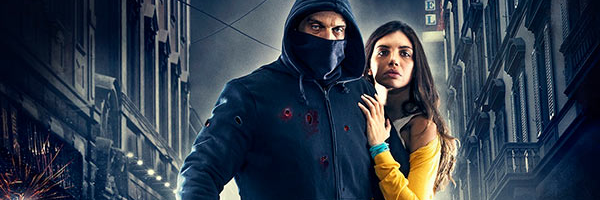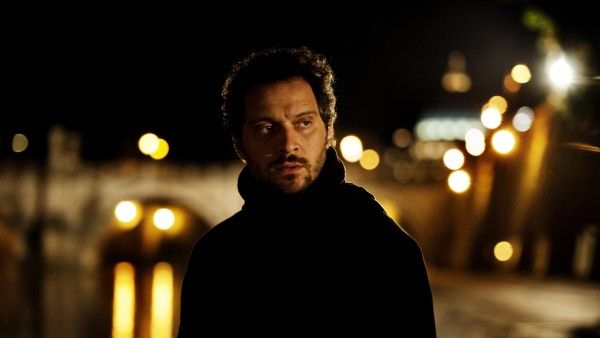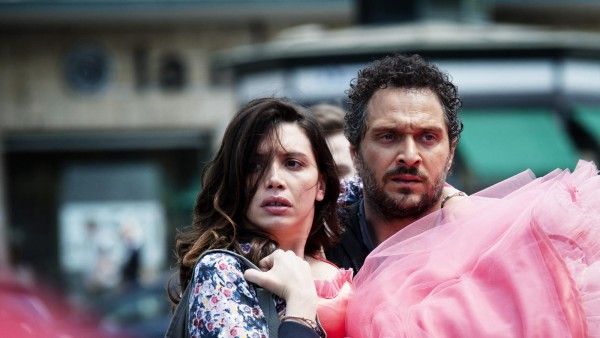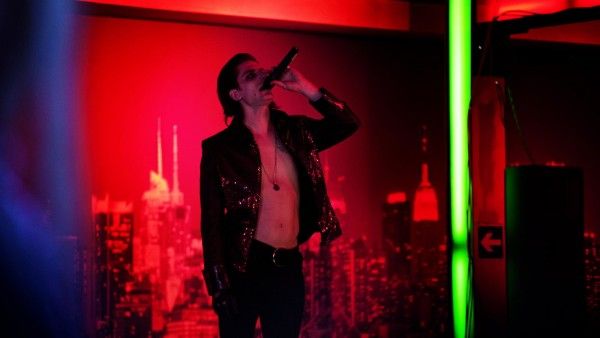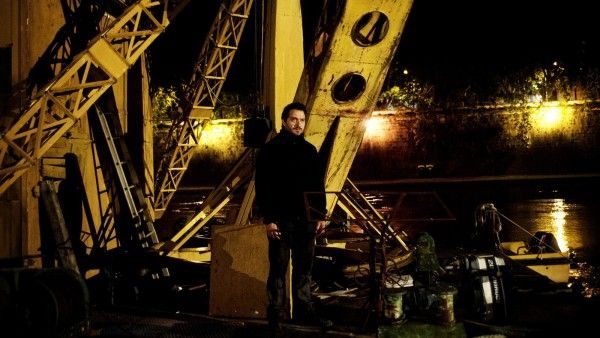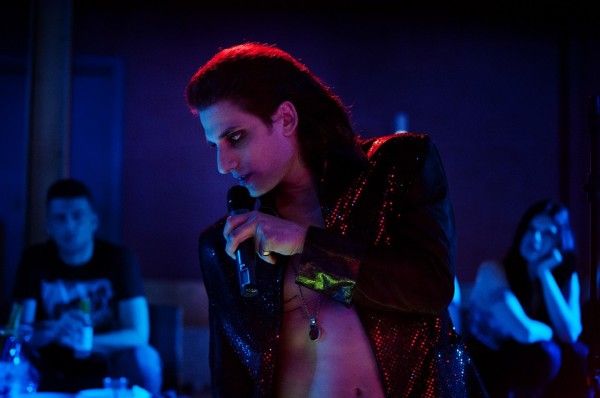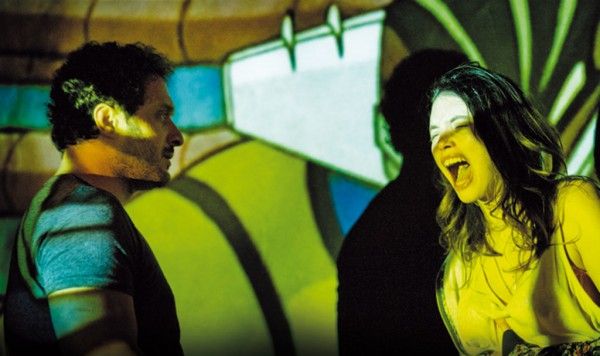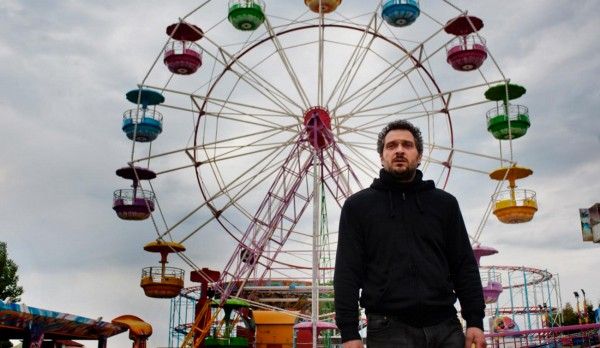A refreshing spin on the saturated superhero genre, Gabriele Mainetti's They Call Me Jeeg (Lo Chiamavano Jeeg Robot) is an uneven but solidly satisfying entry that revamps the format with a gritty aesthetic and a character-driven approach set in the midst of mafia-torn modern Italy.
The film opens on a foot chase as our anti-hero Enzo (Claudio Santamaria), a two-bit criminal and way, way underling for Camorra bosses, makes his escape from his latest misdeed. Enzo takes shelter in the waters of the Tiber river, where he takes an unwitting bath in some mysterious, toxic black sludge. Soon after, he gets very sick. Then he gets very strong. Something he doesn't realize until a job goes wrong, leaving his accomplice dead, and Enzo would be dead right alongside him if he wasn't suddenly able to survive a bullet to the chest and the fall from a nine-story building.
What does he do when he finds out he's got superpowers? More crime. Naturally. See, Enzo's kind of a shitbag. He's a low-rent thug with nothing to believe in, who subsists on pudding and pornography in the downtime from his dirty work. Isolated, misanthropic and lonely, though he'd never admit that last one, Enzo is pretty much a pathetic and undignified ne'er-do-well. So he immediately gets to work robbing ATMs and armored cars. A move that draws instant media attention and viral YouTube fame.
What does he buy with his newfound fortune? More pudding. See, Enzo's kind of a loser too. A cynical shut-in who's eager to remind people he's "nobody's friend," Enzo is stuck in a sort of adolescent "everything sucks" mentality, and would have never put his powers to any good use if he didn't get tangled up with Alessia (Ilenia Pastorelli). Their relationship is where the film finds it's greatest strengths and biggest problems.
Alessia is, as the kids these days like to say, problematic. In a big way. Sergio's troubled daughter, toward whom Enzo feels an immediate attraction and protectiveness, Alessia helps transform Enzo into a hero through the power of her goodness and love, which gets weird at times because Alessia is incredibly child-like and regressive; obsessed with anime and getting her own princess dress. A strange and often inappropriate jumble of archetypes, Alessia is equal parts the damsel in distress, the wise-fool, the woman-child, and the sexy mental patient.
It paints a picture of sexual violence that feels honest and deeply empathetic toward the victim, but ultimately it has nothing new or valuable to say about the issue and Alessia's sole purpose is to further Enzo's development -- you know, the love of a good woman -- so it never becomes more than a cheap narrative ploy. So when they get sexual, it's uncomfortable and weird -- an intentional narrative choice and a wrong-headed price to pay for Enzo's transformation into a good man. It's unfortunate because if Alessia's history of victimization and her bond Enzo was handled differently (and a bit more wisely), the film would be a lot stronger.
Enzo and Alessia have a lovely dynamic and sweet, if unorthodox, love between them -- a fumbling attraction between two adults stuck in immaturity -- and it's effervescent with the chemistry between Pastorelli and Santamaria. Both actors play their roles raw and to the bone, treating the material like they would a prestige drama. Indeed, they took home the best actor and actress prizes at Italy's 60th David di Donatello Awards (Italy's Academy Awards), and their performances are award-worthy, keeping Jeeg afloat and giving the film a messy, passionate heartbeat.
At the same time that Enzo is discovering his powers with Alessia, a would-be mafioso kingpin is on a power-trip, enraged by Enzo's newfound fame. A stringy-haired greaseball who fancies himself a rock star, Luca Marinelli's Gypsy wants people to kneel at his feet so he can piss on their head, and that's before he gets the notion to find some superpowers of his own. A former competitor on a reality talent show, he's a flamboyant, unhinged manic. A bit of the Joker by way of Liberace, prone to show-stopping Karaoke numbers, sequined blazers, and bashing someone's brains in with a phone when he gets angry.
Over the top though Gypsy may be, They Call Me Jeeg doesn't just use gangsters and crime families as backdrop. Screenwriters Nicola Guaglianone and Menotti weave in threads of social commentary throughout. Set against the backdrop of terrorist bombings throughout Rome, Jeeg is rooted in the idea of a contemporary Italy marred by the lasting and violent impact of organized crime. It's not heavy-handed, but it's the undercurrent coursing through the entire film, and it gives the Jeeg a little extra power behind its punch.
Even in the wake of Logan's game-changing approach to comic book violence, the violence in Jeeg is still a unique experience in a superhero film. While Logan was brutal and bloody, it still had a blockbuster sheen and, for lack of a better word, very "superhero-y" action. By contrast, the violent deeds in Jeeg are all too familiar the human evils that plague the world around us -- terrorists, criminals, and sexual predators.
Like all good genre storytelling, the film would still work without the fantasy elements, in this case as a crime world character redemption piece. It wouldn't be nearly as vital or fun, but it would work. Because Enzo's arc is the central thread of the plot, the moment he finally becomes accepts the great responsibilities that come with his newfound great powers is unusually effective. It's always a thrill to see the hero pick up the mantle at the end of an origin story, but because of the emphasis on character drama throughout the film, the payoff is tenfold (and accompanied by one of the most moving "cool guys don't look at explosions" moments ever filmed).
Despite its faults, They Call Me Jeeg is a welcome change of pace in the superhero genre, from it's sloppy, tender emotional core to the distinct cultural lens. As Italy's first superhero movie, Jeeg is far removed from the homogenized tinge detectable in even Hollywood's best genre fare, boasting a singular fusion of styles. Equal parts campy pulp and gritty crime drama, Jeeg pulls the unusual combo off well, regularly dipping toes into very dark waters while always maintaining a deviant sense of humor.
Rating: B-

